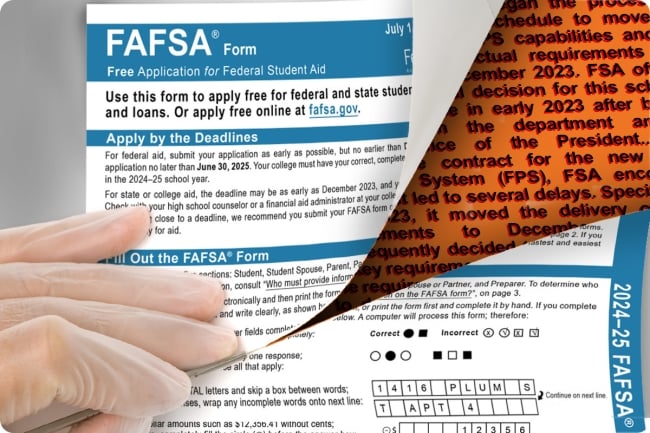You have /5 articles left.
Sign up for a free account or log in.

A new government investigation sheds light on the mistakes behind the FAFSA fiasco.
Photo illustration by Justin Morrison/Inside Higher Ed | 101cats/iStock/Getty Images
A government watchdog’s investigation into last year’s rollout of the new Free Application for Federal Student Aid found that Education Department officials failed to properly test and prepare the form and launched it despite signs that it was not ready for wide release—an oversight that proved disastrous.
The department’s missteps are detailed in two documents from the U.S. Government Accountability Office released Tuesday. Their findings were at the center of a House higher education subcommittee hearing Tuesday that featured testimony from two GAO officials, where lawmakers on both sides of the aisle pressed for answers about who was to blame for the failures and called for accountability.
At the hearing, neither the GAO officials nor the lawmakers expressed confidence in the department’s ability to successfully roll out the 2025–26 application, which is already delayed by two months to allow for testing that’s set to begin next week.
GAO officials warned that the next FAFSA is at risk for even more delays and similar technical issues to last year’s because of systemic problems in the department and the Office of Federal Student Aid, the agency that oversees the FAFSA.
Some of the GAO’s findings have been public knowledge for months. Inside Higher Ed chronicled many of them in a wide-ranging investigation published in March—including the fact that FSA didn’t properly test the new form, carry out independent reviews of its processing system or fix a slew of technical errors in a timely manner.
But the GAO findings, part of a long-anticipated report, offer a first glimpse into the bureaucratic failures behind the scenes, both during the overhaul of the form itself and in the lead-up to its release. The report also contains a number of new revelations about FSA’s handling of the rollout and officials’ strategy for communicating with students and colleges.
For one, the GAO found that as early as August 2022, FSA knew, or at least anticipated, that the 2024–25 FAFSA release would have to be delayed. That month, the office began retooling its schedule for FAFSA processing, moving deadlines for contractors from October 2023—the form’s traditional, and at the time expected, release date—to December, yet they waited seven months to announce the delay publicly.
The GAO suggests FSA officials may have been preparing for a possibility rather than an eventuality, but it’s the first evidence that issues with the rollout timeline emerged more than a year before the launch.
In addition to planning mistakes that waylaid the rollout process, the report found that the department’s communication strategy—both for helping colleges understand the delays and for helping families navigate the form—was inadequate.
Of the 5.4 million calls the Education Department’s call center received during the first five months of the FAFSA rollout, four million—or about three-quarters—went unanswered. According to the report, the department had far fewer staffers operating the center than during the prior year and answered nearly 200,000 fewer calls during the first five months of the rollout.
“The call center’s failure to meet demand became a significant bottleneck for students and families who struggled to get help with pressing issues,” the report said. “All four call center contractors failed their customer satisfaction score during the first five months of the rollout.”
The report also found that the department failed to inform more than 500,000 students of changes to their federal aid estimates that resulted from corrections to calculation errors during the application cycle, leading students to rely on “the inaccurate estimate … to make decisions about which college they could afford.”
These recurring errors—what the GAO report calls “unresolved defects”—that persisted well after launch are what truly vexed struggling families and turned a problematic launch into a yearlong debacle that damaged public trust in the federal aid system.
The GAO’s findings are in line with previous reviews of the FAFSA launch, which all found shortcomings in planning and oversight, which affected the experiences of those on the ground.
Kim Cook, CEO of the National College Access Network, told Inside Higher Ed that the report reflected the challenges that access organizations and underserved students faced last year.
“Issues with the call center, issues for students from mixed-status families—we heard all those things from our members,” she said. “It’s disappointing to read, but certainly not surprising.”
Failures of Foresight
Department officials, including Education Secretary Miguel Cardona, have often said Congress is at least partly to blame for the FAFSA chaos for refusing to allocate increased funding to the overhaul project. But while the GAO report does not dispel the theory that additional resources would have helped avoid the initial launch delay, it draws a more direct connection between the department’s mistakes and the delays and technical glitches that beset the form throughout the application cycle.
The report’s findings all point back to one key misstep: that the FSA moved forward with the rollout while most of the underlying processing system’s essential capabilities were unfinished. At the time of the form’s release, 18 of the 25 “key requirements” for launch had not been met, including “the capability to determine final aid eligibility and distribute those results to schools”—meaning FSA was aware they’d likely have to push back processing months earlier than they announced to colleges. Some financial aid professionals have said that delay was even more disruptive than the initial launch delay, setting back colleges’ timelines for packaging aid offers and forcing many to extend their commitment deadlines.
In fact, the GAO report found that colleges were not informed of the delay until the day before processing was supposed to begin.
The report is primarily focused on the FSA’s role in the troubled rollout. The agency has been at the heart of the fallout: Its chief operating officer, Richard Cordray, resigned in April after backlash, and the Education Department is currently conducting an internal review of the agency.
But the GAO found that there is blame to share across other Education Department offices and leaders. The department’s chief information officer, for instance, “did not provide effective oversight” of the FAFSA rollout: The CIO office initially rated the project a 3, which represented medium risk, but the office didn’t review that rating until June 2024—more than five months after the application launched. The CIO’s office told GAO they did not conduct risk assessments for the overhaul because from 2021 to 2024 they were “revising the department’s related processes” for assessing risk.
The report suggested that high turnover in the CIO office is partly to blame for this oversight. Since the FAFSA overhaul began in 2021, there have been six different Education Department CIOs, according to the report. A “lack of consistent leadership” is one of many more systemic, department-level flaws that the GAO warns could undermine this cycle’s FAFSA launch, which has already been pushed back two months.
“Until the department addresses these weaknesses, it will be hampered in its ability to make needed improvements to [the FAFSA processing system],” the report concludes. “This could put the 2025–2026 FAFSA cycle at increased risk for experiencing further delays and technical errors.”
Can’t Escape the Past
The existence of the GAO report itself has made headlines this past year: Congressional Republicans asked for the investigation in January and then accused the department of obstructing the review.
At Tuesday’s hearing, lawmakers reacted with building indignation to the GAO’s findings.
“It is amazing that [the FAFSA] has been around for 30 years, and it only took two and a half to blow it up totally,” Representative Burgess Owens, a Utah Republican and the subcommittee chair, said in response to the GAO’s findings. “Normally if somebody is this incompetent, they’re fired.”
Democrats have also criticized the Biden administration’s handling of the project, which was mandated by Congress.
“Regrettably, the implementation of the law has been derailed by a series of avoidable mistakes made by the Department of Education,” Representative Frederica Wilson, a Florida Democrat, said in her opening remarks.
Wilson added that she’s been encouraged by the department’s progress for the next application cycle and emphasized the importance of getting this year’s rollout right.
That seems to be where the department’s focus is, too. The department released its own internal report Monday, subtitled “A path forward for the 2025–26 cycle,” in which they said they were “committed to learning from challenges with [last cycle’s] launch” and outlined plans for testing the form to ensure it is “fully functional” upon launching.
After the hearing, the department released a statement highlighting what they’d learned from the challenges of the past year as they approach the start of this year’s phased-in FAFSA rollout next month.
“We have sought advice from students and families, colleges, and partners and provided more than 1,000 documents to the [GAO],” the statement reads. “We have strengthened our leadership team, expanded call center capacity, and begun carefully testing next year’s FAFSA as we work toward fully launching the form.”
But the GAO report’s findings are sure to reignite anger over the department’s handling of the new form just as officials are trying to shift the national conversation toward the future.
A GAO spokesperson told Inside Higher Ed that the office is still investigating the rollout and reviewing the FAFSA processing system; they expect to conclude their work by early next year.









